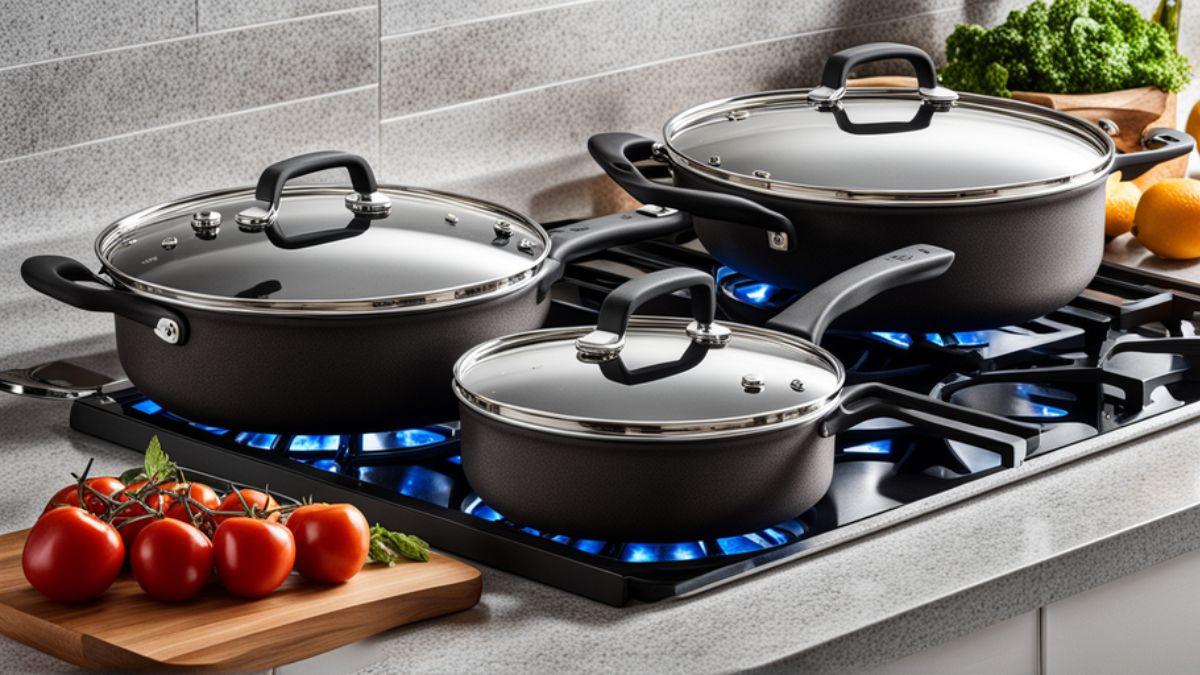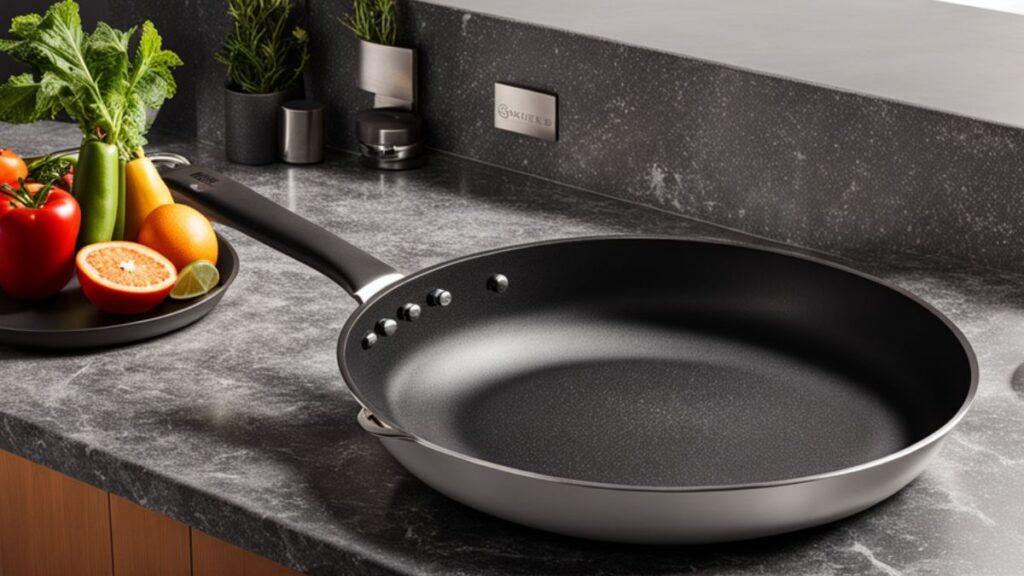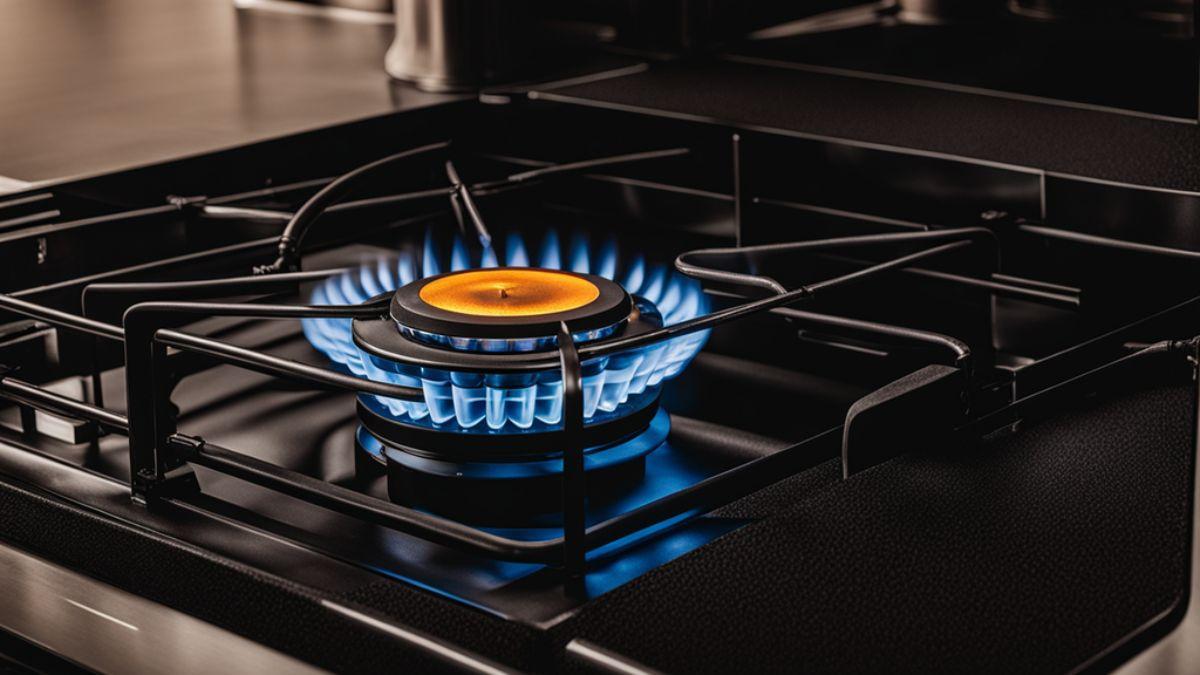
We may earn money or products from the companies mentioned in this post.
Discover the advantages and drawbacks of granite cookware. Our comprehensive guide explores the pros and cons to help you make an informed decision.
You’re considering getting your kitchen upgraded with a new set of granite cookware. The natural, non-toxic substitute for conventional nonstick pots and pans is granite cookware. Is it, however, truly what it seems to be? You should consider the benefits and drawbacks of purchasing granite cookware before making a large purchase to be sure it is the best option for your culinary requirements. We’ll go over the benefits and possible downsides of granite cookware in this article so you can decide if granite is worth the investment for your home kitchen.
An Introduction to Granite Cookware

Granite cookware has become popular in recent years for several reasons. As the name suggests, this type of cookware is made from granite, an extremely durable stone that is resistant to scratches and stains. Granite is also naturally non-stick, meaning you can cook with little or no oil. However, there are some downsides to consider before investing in a set of granite pans.
Pros of Granite Cookware
- Naturally non-stick. The smooth granite surface prevents foods from sticking without the use of unhealthy non-stick coatings. You only need a little oil or butter for most cooking.
- Extremely durable. Granite is one of the hardest materials used for cookware. It won’t scratch, dent,s or warp under high heat. Granite pans can last a lifetime with proper care.
- Safe for all cooking methods. You can use granite cookware on the stovetop, in the oven, under the broiler, or on the grill. The material won’t melt or crack at extremely high temperatures.
- Easy to clean. Granite’s non-stick surface means stuck-on foods wipe right off. A little hot water and dish soap is usually all you need. Granite is also dishwasher-safe for added convenience.
- Chemical-free. No toxic coatings are used in the production of granite cookware. It’s a natural, eco-friendly material.
Cons of Granite Cookware
- Heavyweight. Granite is an extremely dense material, so granite pans tend to be quite heavy. This can make them difficult to maneuver, especially when full of food.
- Prone to chipping. Although very hard, granite can chip if dropped or banged against hard surfaces. Chips in the cooking surface may make the pan unusable. Handle with care.
- Expensive. Due to the cost of the raw granite material and the labor required to shape it, granite cookware tends to be significantly more expensive than standard non-stick or stainless steel cookware. While durable, the initial investment can be quite high.
- Requires seasoning. Granite pans need to be seasoned properly before first use and re-seasoned periodically to maintain an optimal non-stick patina. This requires cleaning, oiling, and heating the pan.
- Not induction compatible. Granite is not a ferromagnetic material, so granite pans will not work on induction stovetops. They can only be used in gas, electric, ceramic, and halogen ranges.
In summary, granite cookware has significant advantages in terms of health, durability, and cooking performance. However, its heaviness, tendency to chip, high cost, and extra maintenance requirements are definite downsides to keep in mind. For some cooks, the
Reed: Granite Cookware Set Review: Is It Worth Buying in 2024
The Pros of Granite Cookware Explored
Granite cookware offers some excellent benefits worth considering.
Granite is naturally non-stick. The smooth, hard surface of granite prevents food from sticking as it cooks. This means you can cook with little or no oil, allowing you to make healthier meals. You’ll also spend less time scrubbing pots and pans.
It distributes heat evenly. Granite absorbs and retains heat well, then distributes it evenly. This allows for consistent cooking temperatures and results in food that is cooked all the way through. No more hot or cold spots!
It’s durable and long-lasting. Granite is an extremely dense and hard material that can withstand high heat and frequent use. Quality granite cookware can last a lifetime with proper care and maintenance.
:
It’s easy to clean. The non-stick properties of granite make it simple to clean. Usually, a quick wipe-down with a sponge or soft scrubber is all that’s needed. Harsher abrasives could scratch the surface, so avoid those.
It’s an eco-friendly choice. Granite is a natural material that is sourced and manufactured sustainably. It does not leach chemicals into food and is non-toxic. Granite cookware is also often repairable if damage occurs.
Of course, there are a couple of potential downsides to consider with granite cookware. It can be heavy, especially larger pieces. It also requires conditioning to maintain the non-stick patina, and acidic foods can damage the surface. However, with proper care and handling, granite cookware can make a wonderful addition to any kitchen.
Reed: Is Thyme and Table Cookware Safe? A Comprehensive Guide
The Cons of Granite Cookware Revealed
Granite cookware certainly has its downsides that you should consider before making a purchase.
Price
Granite cookware tends to be on the higher end of the price spectrum for cookware. The raw materials and manufacturing process required to produce granite cookware result in a higher retail price. While granite cookware can last a lifetime with proper care and use, the upfront cost may be prohibitive for some home cooks.
Weight
Granite is an extremely dense material, so granite cookware can be quite heavy. Large stockpots and saucepans may be difficult to lift and maneuver, especially when full. The weight also makes granite cookware harder to wash by hand since it requires more effort to scrub and rinse. You’ll want to make sure you have a sturdy stovetop and oven that can handle the extra weight before purchasing granite cookware.
Requires Seasoning
Granite cookware typically requires seasoning before first use to create a natural nonstick patina. Seasoning the cookware involves coating it in oil and heating it at a high temperature. This process must be repeated multiple times before the cookware can be used, and the seasoning requires ongoing maintenance to keep granite nonstick. Proper seasoning and care are essential to granite’s nonstick properties and performance.
Thermal Shock
Granite’s density also means it retains heat extremely well. While this is beneficial for cooking and keeping food warm, it also means granite is prone to thermal shock if exposed to extreme or rapid temperature changes. Pouring cold liquid into a hot granite pan or placing a hot pan in cold water can potentially cause cracking. It’s best to allow granite cookware to cool gradually before washing or storing to prevent damage from thermal shock.
In summary, while granite cookware does have some wonderful benefits for cooking and durability, the higher cost, heavyweight, required seasoning, and risk of thermal shock are factors to weigh based on your needs, priorities, and budget in the kitchen. With proper care and maintenance, granite cookware can last a lifetime, but the cons may outweigh the pros for some home cooks.
Reed: Best French Cookware: Top Brands and Products for 2024
Granite Cookware Pros and Cons: A Final Analysis
Granite cookware offers some attractive benefits, but it also has some potential downsides to consider before you buy. Here’s our analysis of the main pros and cons so you can determine if granite cookware is right for your needs.
Pros
- Natural and non-toxic. Granite is an inert rock that won’t leach chemicals into your food. It’s a healthy, eco-friendly choice.
- Superior heat retention. Granite absorbs and distributes heat exceptionally well, allowing for even cooking temperatures. Food stays hot longer after removing from the stove.
- Stylish and durable. Granite cookware has an attractive, high-end look and can last a lifetime with proper care. It won’t scratch, stain, or chip easily.
- Versatile. You can use granite cookware on the stovetop, in the oven, on the grill, or over an open fire. It’s ideal for searing, browning, simmering, and more.
Cons
- Heavy. Granite cookware is dense and can be difficult to maneuver, especially when full. It may not be ideal for those with limited mobility or strength.
- Requires seasoning. Granite cookware needs to be seasoned with oil before first use and after every wash to prevent sticking. This adds extra time and effort.
- Expensive. High-quality granite cookware is an investment and typically costs significantly more than other options like stainless steel or nonstick cookware.
- Not nonstick. Even when properly seasoned, granite cookware may not have the slippery nonstick quality of coated cookware. Sticky foods can still burn and stick.
- Reactive. Granite can react with acidic foods like tomatoes, citrus, and wine, imparting a metallic taste. It may not be the best choice for all recipes.
In summary, if you’re looking for a natural, high-performance, and stylish cookware option and don’t mind the extra care and cost, granite could be an excellent choice. However, for convenient, budget-friendly nonstick cooking, you may prefer alternative materials. The choice is yours!
Making the Right Choice: Your Guide to Granite Cookware
Making the Right Choice: Your Guide to Granite Cookware
When deciding between granite cookware and other options like stainless steel or nonstick, there are pros and cons to consider for your needs and cooking style.
Durability
Granite cookware is extremely durable and long-lasting. It can withstand high heat without warping and is nearly impossible to scratch or dent. Granite pans can last a lifetime with proper care and maintenance. However, the heavyweight material requires extra effort to move around the stovetop and oven.
Heating
Granite distributes heat very evenly and efficiently due to its density. It works on all stovetops including induction. The material gets extremely hot, so you’ll need to use proper potholders and be very careful. Lower the heat setting compared to other cookware.
Non-reactive and Non-toxic
Granite is a natural, non-reactive, and non-toxic material. It won’t leach chemicals into food or react with acidic ingredients. Granite is considered a safe and healthy choice for cookware.
Difficult to Clean
While granite itself is non-porous, the cookware can be challenging to clean since food sticks easily. Soaking in hot, soapy water is typically required. Avoid the dishwasher which can lead to water spots. Bar Keeper’s Friend or a similar abrasive paste may be needed for stuck-on messes.
Price
High-quality granite cookware is an investment. It tends to cost significantly more than stainless steel or nonstick options. However, it may save you money in the long run since it lasts so long.
Choosing between granite or other types of cookware comes down to your specific needs, priorities, and budget. If you want virtually indestructible, all-natural cookware and don’t mind the extra effort required in cleaning and handling, granite can be an excellent choice. For easier care and lower cost, alternative materials may suit you better. Evaluate what factors are most important to you and make the selection that fits your lifestyle.






